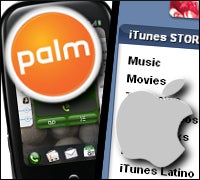 |
Palm’s strategy in its ongoing spat with Apple may have backfired.
The creator of the Pre smartphone has been fighting efforts by Apple to block the Pre from synchronizing music with its iTunes software. In July, Palm appealed to a key hardware standards organization, the USB Implementers Forum (USB-IF), to complain about Apple. According to Palm’s (NASDAQ: PALM) complaint, the stance by Apple, a fellow USB-IF member, unfairly thwarted competition.
But in a letter sent to both companies, the standards body ruled that Apple (NASDAQ: AAPL) isn’t violating policy.
What’s more, the USB-IF took issue with Palm’s entire approach to music-syncing, which relies on the Pre mimicking the USB-IF Vendor ID Numbers used by the Apple iPod — essentially enabling it to masquerade as an Apple device.
According to the group, Palm’s use of Apple’s Vendor ID (VID) Numbers puts it in “potential violation” of USB-IF member policies.
“Under [USB-IF] policy, Palm may only use the single Vendor ID issued to Palm for Palm’s usage,” the trade group said in its letter. “Usage of any other company’s Vendor ID is specifically precluded. Palm’s expressed intent to use Apple’s VID appears to violate the attached policy.”
That’s probably not the reaction Palm had been hoping for. In its original complaint to the USB-IF, Palm had charged that Apple was not acting in “the spirit of the USB-IF Membership Agreement … intended to facilitate interoperability between USB devices, not regulate the content that flows between them.”
In its response, the standards group disagreed, however, finding that Apple’s use of its own Vendor ID Numbers to restrict syncing to Apple-only devices is legitimate.
“Palm’s allegation (if true) does not establish that Apple is using its Vendor ID contrary to USB-IF’s policies,” the group said in its letter. “Therefore, under present USB-IF policy, the USB-IF does not consider the alleged use … to be ‘improper.'”
The USB-IF also said that Palm’s use of ID numbers assigned to Apple may be “specifically precluded” by Forum policies. It called for a response from Palm within seven days.
Advantage: Apple
So far, Palm is remaining tight-lipped about the latest developments.
“We engaged with the USB-IF because we believe consumers should have freedom and choice in how and where they use the non-rights managed media they already own,” Derick Mains, director of corporate communications for Palm, told InternetNews.com. “We are reviewing the letter from the USB-IF and will respond as appropriate.”
Apple spokespeople declined to comment. Spokespeople for the USB-IF did not return requests for comment by press time.
The news marks the latest turn of events in an ongoing spat between the two hardware vendors. Apple first took steps to curb the Pre’s syncing with iTunes two months after the phone debuted, when it bumped iTunes to version 8.2.1.
A week later, Palm re-enabled iTunes syncing with the release of version 1.1 of webOS, the Pre’s underlying software.
Apple retaliated soon after, again blocking the Pre with its Sept. 9 iTunes 9 update.
[cob:Special_Report]The latest wrinkle for Palm also comes amid the onetime mobile device pioneer’s ongoing efforts to reinvigorate itself.
The company is basing much of its turnaround hopes on a new ecosystem built around its new mobile operating system, webOS, and the family of smartphones it powers: the Pre and the newer, smaller Pixi.
Palm’s comeback bid is being led by newly installed CEO Jon Rubinstein, who had been integral in Apple’s own dramatic turnaround. As Apple’s former head of hardware engineering, Rubenstein led the development of the iMac, iBook and iPod.
Palm had been widely expected to issue an update to webOS this week, bringing its webOS software to version 1.2.1 and restoring the Pre’s ability to sync to Apple iTunes.


